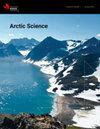Nunaaqqit savaqatigivlugich -与社区合作:围绕阿拉斯加北极观测站和知识中心开展合作
IF 3.2
3区 地球科学
Q2 ECOLOGY
引用次数: 2
摘要
北极各地的土著人民自古以来就适应了环境变化,但最近的气候变化造成了前所未有的突然变化,影响了社区赖以生存的陆地和海洋。共同创建的以社区为基础的观测项目提供了一个机会,可以利用社区的整体知识广度来跟踪北极变化,同时支持社区优先事项和地方规模的需求。阿拉斯加北极观测站和知识中心(AAOKH)是一个由来自阿拉斯加北部沿海社区的Iñupiaq观测者与学术研究人员合作组成的网络。在这里,我们描述了通过AAOKH出现的五个核心功能,包括跟踪长期环境变化;传播由土著居民主导的环境观察及其意义;基于地点和与文化相关的教育;促进科学和土著知识交流;支持社区主导的应对环境变化的措施。我们概述并讨论了具体的行动和机会,这些行动和机会已被用于增加AAOKH观察结果的知识交流,为下一代土著学者腾出空间,并创建与当地相关的数据产品和综合资料,为资源管理和社区规划提供信息。我们还讨论了我们正在进行的努力,以越来越多地转向知识合作生产框架,因为我们计划在未来维持AAOKH。本文章由计算机程序翻译,如有差异,请以英文原文为准。
Nunaaqqit Savaqatigivlugich—working with communities: evolving collaborations around an Alaska Arctic observatory and knowledge hub
Indigenous Peoples across the Arctic have adapted to environmental change since time immemorial, yet recent climate change has imposed unprecedented and abrupt changes that affect the land and sea upon which communities rely. Co-created community-based observing programs offer an opportunity to harness the holistic breadth of knowledge in communities with the goal of tracking Arctic change while simultaneously supporting community priorities and local-scale needs. The Alaska Arctic Observatory and Knowledge Hub (AAOKH) is a network of Iñupiaq observers from northern Alaska coastal communities working in partnership with academic researchers. Here, we describe five core functions that have emerged through AAOKH, which include tracking long-term environmental changes; communicating Indigenous-led observations of the environment and their meaning; place-based and culturally relevant education; enabling scientific and Indigenous Knowledge exchange; and supporting community-led responses to environmental change. We outline and discuss specific actions and opportunities that have been used to increase knowledge exchange of AAOKH observations, make space for the next generation of Indigenous scholars, and create locally relevant data products and syntheses that can inform resource management and community planning. We also discuss our ongoing efforts to increasingly shift toward a knowledge coproduction framework as we plan to sustain AAOKH into the future.
求助全文
通过发布文献求助,成功后即可免费获取论文全文。
去求助
来源期刊

Arctic Science
Agricultural and Biological Sciences-General Agricultural and Biological Sciences
CiteScore
5.00
自引率
12.10%
发文量
81
期刊介绍:
Arctic Science is an interdisciplinary journal that publishes original peer-reviewed research from all areas of natural science and applied science & engineering related to northern Polar Regions. The focus on basic and applied science includes the traditional knowledge and observations of the indigenous peoples of the region as well as cutting-edge developments in biological, chemical, physical and engineering science in all northern environments. Reports on interdisciplinary research are encouraged. Special issues and sections dealing with important issues in northern polar science are also considered.
 求助内容:
求助内容: 应助结果提醒方式:
应助结果提醒方式:


